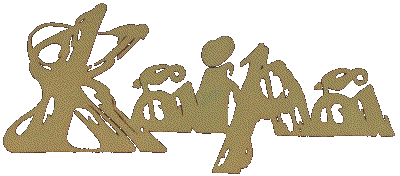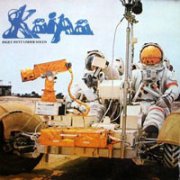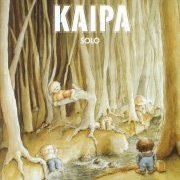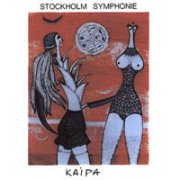




 |
 |
 |
 |
 |
 |
Inget Nytt Under Solen (1976, 39.55/76.47) ****/TT |
|
| Skenet Bedrar Uppvaknandet Bitterheten Hoppfullheten Överheten Vilseledd Ömsom Sken Korståg Stengrodornas Parad Dagens Port |
Inget Nytt Under Solen [CD adds: Awakening/Bitterness How Might I Say Out Clearly The Gate of Day Blow Hard All Tradewinds Skenet Bedrar (live) Från det Ena Till det Andra] |
|
 |
Solo (1978, 50.47) ***½/T½ |
|
| Den Skrattande Grevinnan Sen Repris Flytet Anar Dig Frog Funk Visan i Sommaren Taijgan Respektera Min Värld |
En Igelkotts Död Total Förvirring Sist på Plan |
|
Current availability:
Mellotrons used:
Kaipa are largely notable these days for being Roine Stolt of The Flower Kings' first band, when he was in his teens. They were actually really good in their own right, 1974's Kaipa (****) being an excellent, if low-budget start to their career. On Inget Nytt Under Solen the band refined their influences and bought or hired in some new gear, including a Mellotron M400. They go straight for the jugular with their only side-long piece, the multi-part Skenet Bedrar (It's Not What it Seems), which works well, doing all the usual prog things, which I suppose makes them the most successful purveyors of 'mainstream' symphonic prog from Sweden at the time (they were actually on Swedish Decca). Plenty of other good material, too, including Korståg (Crusade) and the title track (Nothing New Under the Sun). Hans Lundin doesn't actually use the Mellotron that much, but there's some gorgeous choir work on both Hoppfullheten and particularly Korståg, plus some rarely-heard M400 brass on Bitterheten and the title track. Highly recommended. Incidentally, the CD adds a live version of Skenet Bedrar, an outtake from their debut and four English-language mixes of Inget Nytt tracks, which repeat the Mellotron parts from the originals, of course.
Solo turned out to be Kaipa's last progressive album. Having recruited a singer, the band wrote a bunch of shorter, though still progressive material, still obviously them, although a Focus influence is apparent in places, as with their countrymen Dice. It seems the band never owned a Mellotron and the one they hired in for Solo (on Stolt's insistence) was in the last stages of terminal breakdown; the CD sleevenotes claim they only used it on Taijgan, which begs the question, "So what exactly is that on opener Den Skrattande Grevinnan?" Both tracks feature rich choir chords, making you wish they'd used it a little more extensively, but it obviously wasn't up to the rigours of, well, anything really.
In the months after the album's release, members started drifting away, leaving a pop/rock outfit led by Lundin, who released two final albums, 1980's Händer and the following year's Nattdjustid. Stolt's new band, Fantasia, also headed in a commercial direction, so avoid any of these albums, although Lundin released three albums of 'electronic progressive rock', whatever you take that to mean, in Tales, Visions of Circles of Sounds and Houses, but I've no idea what they're actually like. After the wasteland of the '80s, Stolt released a solo album, The Flower King (****) in 1994, quickly forming the band of the same name, who played the odd Kaipa song in early live sets. The Flower Kings are notable on this site for a) using both mine and my mate Gary's Mellotrons at different UK gigs and b) crediting Mellotron on their albums while using samples. Tut tut.
After a twenty-year layoff, Kaipa reformed around 2001, or at least, Lundin (fresh from his work with Hagen) and Stolt got back together to breathe fresh life into the name. As with Hagen, despite Lundin's 'Mellotron' credit, we're clearly in Sample City here. The Flower Kings' credits for the instrument are definitely bogus (I asked them) and Stolt's 'Mellotron' work on the Transatlantic albums is fake, too, so I reckon I'm onto a winner.
2002's Notes From the Past sounds rather like a cross between Kaipa of old and The Flower Kings, although Stolt apparently had no hand in the compositional process. It's a good album, if lacking the moments of greatness that the original band could conjure up occasionally and, at almost eighty minutes, it drags in places. The part-time female vocals are a bit unnecessary, too, giving the thing a slight MOR feel on some tracks. Yet again, just because you can fit eighty minutes of music on a CD... Maybe a few more plays will reveal the album's charms, but on first hearing it seems to lack something. After Stolt's semantics-juggling on his own albums, I'm more than suspicious of the huge slabs of Lundin's 'Mellotron' splattered all over the album; loads of great samplotron work on every track, anyway, with several unaccompanied sections dotted about and much overdubbing of strings, flutes and choirs. As with The Flower Kings, Kaipa followed Notes From the Past almost immediately with Keyholder, effectively more of the same, but possibly with slightly stronger songwriting. It's difficult to find anything much to say about this album that I haven't just said about its predecessor, to be quite honest; halfway between old Kaipa and the Flower Kings, with rather too much of the latter, especially in Stolt's guitar work, overlong, but overall perfectly pleasant, loads of 'Mellotron'... I think you get the general idea. You're just gonna have to hear it and decide for yourself.
Two years on and Mindrevolutions sounds more like a Flower Kings album than ever, to be honest, with a horrible 'funky' bit in the extremely lengthy title track that made me shudder. Once again, this could've been at least twenty minutes shorter and correspondingly more effective; what IS this obsession with length? (Fnar fnar). Anyway, more of the usual, although it's actually Stolt's last album with the band, leaving the reins firmly in Lundin's hands. 'Mellotron' on most tracks, although it takes a while to kick in, with some barely audible flutes at the end of Electric Leaves. From Mindrevolutions itself on, though, it's Mellotron-a-go-go, with flutes, strings and choirs all over, although looking at the credits on the band site for their 2007 opus, Lundin is credited with 'electric, acoustic and virtual instruments', so I really wouldn't put too much money on the Mellotron being real.
2007's Angling Feelings still features various Flower Kings, guitarist Per Nilsson taking Stolt's place. It starts well enough, with the vaguely fusionesque opening title track, but by around halfway through it descends into an uncomfortable fusion/prog-lite/MOR crossover, accentuated again by Aleena Gibson's vocals, barely scraping three stars overall. Plenty of 'virtual Mellotron', with strings all over the place and occasional choir and flute parts, but, sad to say, Kaipa albums seem to be becoming less and less essential as time goes by. 2010's In the Wake of Evolution is no improvement, sadly; despite some lovely, almost Focus-like moments on closer The Seven Oceans Of Our Mind, the bulk of the album just goes on and on to no great purpose, with far too many MOR-ish bits for its own good. Very little samplotron, just strings here and there, with real strings on The Words Are Like Leaves.
2012's Vittjar is something of an improvement and would easily have gained another half star were it twenty minutes shorter and Aleena Gibson were excised from the mix. Highlights include the exceptionally dynamic Lightblue And Green and bits of most other tracks, while an increased folkyness doesn't go amiss, although the more recent fusion influence rears its head in several places. Unfortunately, most of The Crowned Hillsides is pretty dull and middle of the road, a malaise that affects much of the album, not least the twenty-two-minute Our Silent Ballroom Band. Lundin keeps the fakeotron use to a minimum, with subtle strings on opener First Distraction and polyphonic flutes on Lightblue And Green, amongst several other minor uses.
 |
Stockholm Symphonie (recorded 1974/76, 54.55) ****/TAllting Har Sin BörjanFörlorad i Istanbul Saker Har Tva Sidor Musiken är Ljuset Korståg Stengrodornas Parad/Inget Nytt Under Solen Hoppfullheten/Överheten/Vilseledd |
Mellotron used:
Kaipa's Stockholm Symphonie is often sold as a legitimate release, originally appearing on a Japanese label in 1993, but its no-show on their recent The Decca Years 5-CD box pretty much proves its lack of legality, I think. Definite information is hard to come by, but it appears to be sourced from radio broadcasts (no audience track) from Tonkraft in 1974 and '76 (thanks, Discogs), featuring material from their first two albums, Kaipa and Inget Nytt Under Solen. The playing is excellent, as is the song selection, including the brilliant Musiken Är Ljuset from their debut, the only problem being that Roine Stolt's guitar seems to be mixed noticeably higher than Huns Lundin's keyboards, although it's clearly a desk recording.
Now, I know the band never owned a Mellotron, hiring one in for their two relevant albums, so it's quite surprising to hear one used here. Lundin seems to have effectively reproduced his album parts from Inget Nytt on the '76 recording, with choirs on Korståg and Hoppfullheten (part three of Skenet Bedrar), although all strings are string synth generated, for some strange reason, as on their albums. This isn't that difficult to find and can even be bought from some legit retailers, working on the assumption that it's at least condoned by the band, so if you like their studio work, I doubt if you'll be disappointed. Very little Mellotron, however, making you wonder why they even bothered.
See: Hagen | The Flower Kings | Roine Stolt